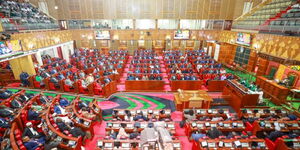Kenya Kwanza government has a tight deadline of seven working days to ensure the passage and subsequent signing of the Finance Bill 2024 by President William Ruto.
The Bill is crucial as it sets the financial framework for the upcoming Fiscal Year 2024/2025, commencing on July 1.
Traditionally, the Finance Bill was enacted 90 days after the Appropriations Bill, aligning with a June 30 deadline. However, recent amendments to the Public Finance Management (PFM) Act have tightened this timeline, mandating the Bill's enactment by June 30 and its operationalisation by July 1, to enable the Kenya Revenue Authority (KRA) to commence tax collection promptly each fiscal year.
Before the Bill becomes law, it must navigate several procedural hurdles.
Originating from the National Treasury, the Bill was formally introduced to the National Assembly alongside the annual national government estimates. This process, in accordance with Section 37(2)(c) of the PFM Act, sets the stage for parliamentary debate and scrutiny.
The Bill then proceeded to the Finance and National Planning Committee of the House, chaired by Molo MP Kimani Kuria, which conducted public hearings.
Following deliberations, the Committee submitted its report on Tuesday, June 18, outlining its recommendations and potential amendments.
MPs are now poised to debate the Bill based on the Committee's report, and are expected to vote on the Bill on Thursday, June 20.
This stage allows for clause-by-clause scrutiny and the introduction of further amendments if deemed necessary. The outcome of this debate hinges on a parliamentary vote following the second reading, where MPs will decide whether to adopt the Bill as proposed or to propose amendments.
With Kenya Kwanza holding a majority in Parliament and having already addressed many contentious issues within the Bill, its passage seems likely. However, the specifics of any amendments proposed during the debate remain uncertain, raising questions about the final form of the legislation.
Once approved by Parliament, the Bill will proceed to President Ruto for assent. According to constitutional provisions outlined in Article 115, the President must either sign the Bill into law within 14 days or return it to Parliament with reservations for reconsideration.
Parliament, in turn, may choose to amend the Bill to accommodate the President's reservations or pass it unchanged with a two-thirds majority vote.
Should the President neither sign nor return the Bill within the stipulated timeframe, it automatically becomes law on the 14th day from its transmission to the President for assent.
Last year, President Ruto signed the Finance Bill 2023 on June 26, underscoring the importance of timely legislative processes in financial governance.
As the clock ticks towards June 30, all eyes are on Parliament and the Executive to ensure that the Finance Bill 2024 is enacted smoothly, setting the stage for Kenya's fiscal policies in the coming year.
The implications of this legislation are far-reaching, affecting everything from revenue collection to public spending priorities.












